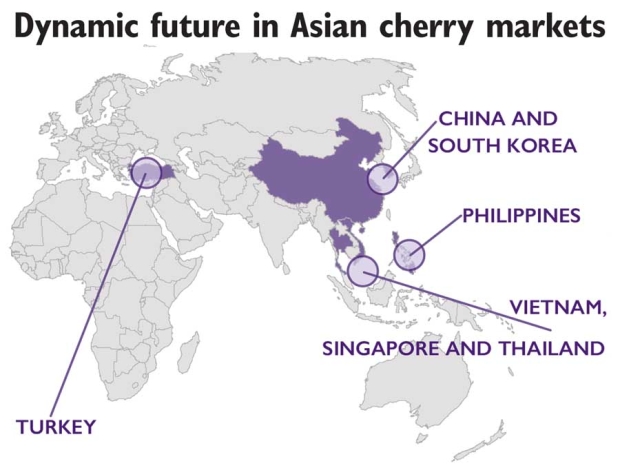Cherry exporters likely will face a challenging 2016 as China’s contracting economy drags down other Asian nations with it, though the horizon holds a few bright spots.
That’s the message from Keith Hu, international marketing director for Northwest Cherry Growers, the promotional arm for cherry producers in Washington, Oregon, Idaho, Utah and Montana, based in Yakima, Washington.
The outlook for next year is OK, he said — not very negative, “but there are for sure certain things we need to be cautious about.”
China heralds most of the bad news.
Analysts expect the economic growth in the world’s most populous nation to slow to between 3 percent and 7 percent, which would hamper the economies of its major trading partners, such as South Korea.
In 2015, the two nations took in 43 percent of the Northwest’s cherry exports, Hu said. China imported 1.81 million 20-pound boxes of cherries, a high volume, but didn’t pay well in August for heat-damaged fruit shipped by ocean containers.
“Speaking to many, many export managers, the final return is questionable,” Hu said.

China and South Korea: The two nations alone account for more than 40 percent of Northwest cherry exports, but China’s economy is expected to contract in 2016, dragging Korea down with it. Philippines: A potential new cherry market with 101 million people and growing wealth concentrated in port cities. The nation imposes a 5 percent tariff on U.S. cherries, apples and pears. Vietnam, Singapore and Thailand: Growth in Southeast Asian markets could temper Chinese struggles. Turkey: Cherry growers are starting to sell in China. Source: Northwest Cherry Growers. (Ross Courtney and Jared Johnson/Good Fruit Grower illustration)
Canada represented the largest cherry market at 32 percent of Northwest exports in 2015. Meanwhile, potential growth in Vietnam, Singapore and Thailand could help the industry weather China’s storm, Hu said.
Vietnam importers paid some of the highest prices at more than $60 per box before adjustments in 2015.
Meanwhile, Hu expects more competition from Turkish cherries in China’s markets.
“We all know they produce decent cherries,” Hu said.
However, Northwest exporters have a shipping advantage over their Turkish competitors: a smoother, shorter drive to Sea-Tac Airport than Turkey’s growers have to Istanbul, where the nation’s closest international airport is located.
On the bright side in China, Hu’s marketing programs showed a higher return on investments — $184 dollars per $1 of promotion spending — of anywhere in the world. South Korea was second, with Mexico third.
Also, Northwest cherries are reaching a broader geographic area in China, with exports up in China proper and down in Hong Kong, Hu said. Sea-Tac now offers two direct passenger flights to Beijing some days, opening up more cargo space.
In spite of the struggles in China, the country still represents some of the strongest potential, Hu said.
The nation will have 500 million middle class people within 15 years, Jack Ma, founder and executive chairman of online retail giant Alibaba Group, told CNBC in a November interview.
Alibaba sells Northwest cherries through online orders, often at premium prices. Last year, Wapato, Washington, grower Peter Verbrugge helped ring the New York Stock Exchange bell when Alibaba sold its first public shares.
Promise in the Philippines
Hu has a hopeful hunch about the Philippines, a nation of 101 million people with rapidly growing cities and an expanding economy.
“The Philippines have been on my radar for the past couple of years,” he said.
This year, Hu plans to apply for a grant of about $100,000 from the U.S. Department of Agriculture’s Emerging Market Fund to train retailers and importers there how to handle and promote cherries.
The cherry industry shipped about 4,500 boxes to the Philippines in 2015.
Washington also exported 395,000 40-pound boxes of apples to the Philippines, more than to the entire European market, during the 2014-2015 crop season, but less than 500 44-pound boxes of pears.
The nation currently imposes a 5 percent tariff on all three types of fruit from the United States.
However, Hu draws most of his encouragement from California table grapes, which have done relatively well, even in years when the Philippine peso was very weak compared to the U.S. dollar. Meanwhile, several Asian airlines have daily flights to Manila, giving shippers potential cargo space.
Another marketer also gave a cautious outlook.
Roger Pepperl, marketing director for Stemilt Growers in Wenatchee, said the overall global economy, with a strong U.S. dollar, will make it hard for American firms to export anything in 2016, not just cherries.
“It’s tough to see right now with the dollar the way it is,” he said.
Pepperl said low global fuel prices might keep shipping costs low but could mean less income for buyers in oil exporting nations. He also cautioned shippers to deliver prudent volumes to overseas markets to keep prices up.
“We have to be responsible to markets and not overfill them,” he said. “Not underfill them or overfill them.” •
– by Ross Courtney






Leave A Comment